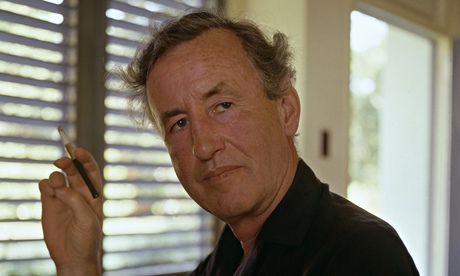
In July 1943, a dashing young naval commander named Ian Fleming, the assistant to the director of British naval intelligence, was dispatched to a high-level Anglo-American conference in Jamaica to deal with the urgent problem of U-boat raiders in the Caribbean. One of the wilder rumours surrounding this little-known sideshow in the second world war was that one of Goering's circle, a sinister Swede, had built a secret submarine base on a private island near Nassau. It was Fleming's first visit to Jamaica, and he was entranced. A few days later, as his homebound plane climbed out of Kingston, the restless young intelligence officer turned to his neighbour. "I have made a great decision," he declared. "When we have won this blasted war, I am going to live in Jamaica and lap it up, and swim in the sea and write books."
Remarkably, Fleming fulfilled this boast. For the next decade, while postwar Britain shivered and starved its way into the 50s, Jamaica's soft breezes and hard liquor became the go-to tropical paradise for those Englishmen still addicted to the sweets of empire. Fleming went further than most. In "Old Jamaica" he acquired a coastal plot of land near Ocho Rios, and built a bungalow (emphatically not a villa) overlooking the sea.
Goldeneye became the place where another commander, James Bond, CMG, RNVR, would be born. Fleming had found the name on the cover of an ornithological guide, Birds of the West Indies. James Bond, he later admitted, was "the dullest name I ever heard", but perfect for his purposes. "I wanted Bond to be an extremely dull, uninteresting man to whom things happened," he said. "I wanted him to be a blunt instrument…"
In 1953, 10 years after Fleming reached his "great decision", the first Bond book, Casino Royale, was published by Jonathan Cape and his "blunt instrument" unveiled. The rest is the story of a golden typewriter, and an indulgent newspaper, the Sunday Times, which allowed Fleming, its maverick managing editor, an annual two months' holiday in the Caribbean. For 10 successive New Years, the James Bond series was hammered out every morning at a redwood desk in a shady corner of Fleming's bedroom. The chain-smoking author punctuated the day's work with swimming and cocktails.
Fleming, for whom "all history is sex and violence", took every inspiration from Jamaica. Matthew Parker does not replace two excellent, competing Fleming biographers, John Pearson and Andrew Lycett, but his account of the role Goldeneye played in the evolution of 007 is persuasive, well-researched and entertaining. Parker describes very well how this outpost of empire supplied Fleming with the perfect cocktail of old-fashioned British law, order and imperial restraint mixed with danger, sensuality and exotic excitements: the same combination, indeed, that made the Bond novels so successful.
More than the expatriate Brits, it was the Americans who lapped up this kind of luxury. When Evelyn Waugh came to stay at Goldeneye, he noted crossly that "the whole north coast has quite lately become the resort of millionaires, mostly American". Perhaps he got this insight from his host. There's a strong streak of anti-Americanism throughout the Bond books, matched by a misty-eyed nostalgia for imperial games. Bond, licensed to kill, is that archetypal agent, "a romantic at heart, like all the silly bastards who get mixed up in the service". That's almost a description of Fleming in his prime.
His literary moment in the sun was brief, and success did not favour Fleming, or his wife, Ann. They both had affairs, he with Blanche Blackwell; she with Hugh Gaitskell. Parker breaks new ground in his account of Fleming's decline, and its poignant echo in the Bond novels. While she became estranged, he smoked and drank too much. By 1963, working on You Only Live Twice, he could barely manage an hour a day at his typewriter, "going to bed drunk every night". Meanwhile, the island paradise had become overrun by tourism. When Fleming first built Goldeneye, there were scarcely 1,000 hotel beds on Jamaica. By 1962, the year that saw the release of the first Bond film, Dr No, there were more than 7,000. Today, where once Noël Coward, Winston Churchill, Anthony Eden and the gilded butterflies of postwar Britain navigated the rutted road from Ocho Rios to Goldeneye in Old Jamaica, there's an airstrip named Ian Fleming International Airport.
Goldeneye is published by Hutchinson (£20). Click here to buy it for £16 with free UK p&p

